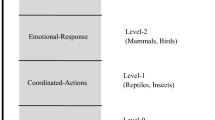Abstract
This paper deals with the problematics of artificial intelligence and is devoted to problems of investigation of natural systems and synthesis of artificial intelligence systems. The specificity of functioning of biological intelligence systems is illustrated by simple examples. These examples allow one to disclose a probable mechanism that provides the formation of consciousness inherent in living beings and whose explicit manifestation is thinking. The natural-science aspect of the content of fundamental concepts such as semantics and knowledge is also considered as applied to the functioning of these systems. Based on paradigms of several scientific schools and that of system approach, general concepts and approaches to the solution of the problem of artificial intelligence are presented.
Similar content being viewed by others
REFERENCES
N. M. Amosov, Artificial Intelligence [in Russian], Naukova Dumka, Kiev (1969).
N. M. Amosov, A. M. Kasatkin, L. M. Kasatkina, and S. A. Talayev, Automata and Rational Behavior: An Experience of Simulation [in Russian], Naukova Dumka, Kiev (1973).
N. M. Amosov, T. N. Baidyk, A. D. Gol’tsev, A. M. Kasatkin, L. M. Kasatkina, E. M. Kussul’, and D. A. Rachkovskii, Neurocomputers and Intelligent Robots [in Russian], Naukova Dumka, Kiev (1991).
G. Nikolis and I. Prigogin, Exploring Complexity: An Introduction [Russian translation], Mir, Moscow (1990).
C. Shannon, A Composite Volume of Works on Information Theory and Cybernetics [Russian translation], Inostr. Lit., Moscow (1963).
H. Haken, Information and Self-Organization: A Macroscopic Approach to Complex Systems [Russian translation], Mir, Moscow (1991).
N. Wiener, Cybernetics or Control and Communication in the Animal and the Machine [Russian translation], Nauka, Moscow (1983).
F. Bloom, A. Lazerson, and L. Hofstadter, Brain, Mind, and Behavior [Russian translation], Mir, Moscow (1988).
K. Pribram, Languages of the Brain: Experimental Paradoxes and Principles of Neuropsychology [Russian translation], Progress, Moscow (1975).
W. R. Ashby, Design for a Brain: The Origin of Adaptive Behavior [Russian translation], Izd. Inostr. Lit., Moscow (1962).
H. Haken, Advanced Synergetics: Instability Hierarchies of Self-Organizing Systems and Devices [Russian translation], Mir, Moscow (1985).
A. Yu. Loskutov and A. S. Mikhailov, Introduction to Synergetics: A Study Guide [in Russian], Nauka, Moscow (1990).
P. K. Anokhin, “The theory of a functional system,” Usp. Mat. Nauk, 1, No.1, 19–54 (1970).
P. K. Anokhin, “Fundamental questions of the general theory of functional systems,” in: Principles of System Organization of Functions, Nauka, Moscow (1973), pp. 5–61.
P. K. Anokhin, Essays on the Physiology of Functional Systems [in Russian], Meditsina, Moscow (1974).
F. Wosserman, Neurocomputer Technics: A Theory and Practice [Russian translation], Mir, Moscow (1992).
O. G. Rudenko and Ye. V. Bodyanskii, Foundations of the Theory of Artificial Neural Networks [in Russian], Teletekh, Kharkov (2002).
R. Callan, The Essence of Neural Networks [Russian translation], Izd. Dom “Williams,” Moscow (2001).
S. Haykin, Neural Networks: A Comprehensive Foundation, Prentice Hall, NJ (1999).
M. T. Hagan, H. B. Demuth, and M. Beale, Neural Network Design, PWS Publishing, Boston, MA (1996).
A. Hoffmann, Paradigms of Artificial Intelligence: A Methodological and Computational Analysis, Springer-Verlag, Singapore (1998).
R. Bellman, Adaptative Control Processes: A Guided Tour [Russian translation], Nauka, Moscow (1964).
M. Amamiya and Yu. Tanaka, Computer Architectures and Artificial Intelligence [Russian translation], Vol. 5, Mir, Moscow, (1993).
Author information
Authors and Affiliations
Additional information
Translated from Kibernetika i Sistemnyi Analiz, No. 6, pp. 73–86, November–December 2004.
Rights and permissions
About this article
Cite this article
Shevchenko, A.V. A hypothesis of consciousness or intelligent neuronet information systems. Cybern Syst Anal 40, 849–859 (2004). https://doi.org/10.1007/s10559-005-0024-9
Received:
Issue Date:
DOI: https://doi.org/10.1007/s10559-005-0024-9




